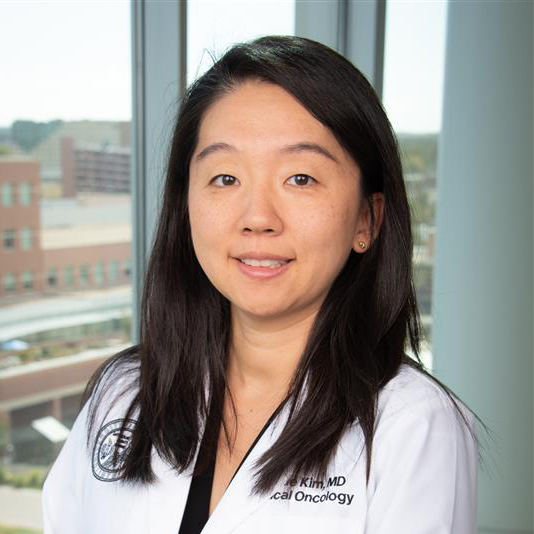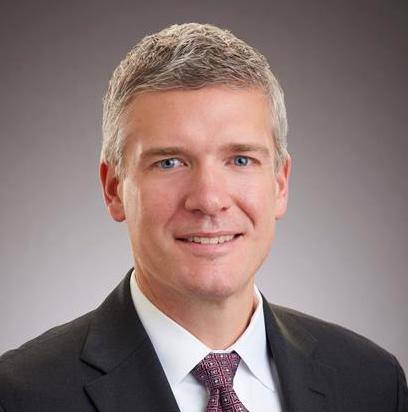As a Denver-based sales specialist for a company that manufactures chemotherapy medications, Anthony Seniw knew the cancer care landscape across Colorado’s Front Range very well.
That’s why, when Seniw was diagnosed with esophageal cancer in 2021, he came directly to the University of Colorado Cancer Center for his care.
“I've been calling on CU Anschutz for over 10 years,” Seniw says. “I knew where I needed to go.”
Choking hazard
Seniw’s esophageal cancer symptoms appeared while he and his son were attempting to drop a few pounds. After a workout, his son prepared a simple meal of boneless, skinless chicken breast and rice — and Seniw nearly choked to death while eating it.
“I was like, ‘Yeah, this is not right.’ I thought there had to be something wrong,” he remembers. “So I made an appointment with an ENT. She scoped me and didn’t see anything. Then, just before I left, she said, ‘I want to do one more test.’”
Clinical trial candidate
Seniw had a barium swallow test — also called an esophagogram — that revealed a mass in his lower esophagus. That was followed by an endoscopy that confirmed a diagnosis of esophageal cancer. His next stop was the CU Cancer Center’s esophagogastric multidisciplinary clinic, where he was evaluated by doctors, surgeons and others, all in one visit. One of those doctors, CU Cancer Center member Sunnie Kim, MD, mentioned a clinical trial of a new chemotherapy regimen for esophageal cancer for which she thought Seniw would be a good fit.
“Knowing what I know about oncology, I know that the only way oncology moves forward is through clinical trials,” Seniw says. “So I said, ‘Yeah. Sign me up.’”
Designed by CU Cancer Center member Jeffrey Olsen, MD, the trial evaluates the potential of treating esophageal cancer patients with three additional rounds of a chemotherapy known as FLOT — a combination of four drugs — prior to the standard chemotherapy and radiation regimen (known together as chemoradiation) typically given prior to surgery.
“The standard of care at the time we developed the study was to give a combination of chemotherapy and radiation before surgery for patients who are operative candidates,” says Olsen, professor of radiation oncology in the CU School of Medicine. “But even with that standard of care, a significant proportion of patients still develop recurrences, in particular, metastatic recurrences. The motivation for the trial was to utilize a newer chemotherapy regimen called FLOT, which had been promising in several other studies. As a group, we hope that combining the previously established benefit from the chemoradiation, but putting it in sequence with the additional FLOT chemotherapy, could reduce distant metastases.”
The additional three doses of FLOT chemotherapy lengthened Seniw’s treatment time before surgery, but the combination worked just as Olsen and Kim hoped. The surgery was a success, and following a year of immunotherapy infusions post-surgery, Seniw is doing well, with no signs of the disease returning. That’s good news especially in esophageal cancer, where the disease can spread upon return, Kim says.
“When patients experience disease relapse, it usually comes back outside of the esophagus,” says Kim, associate professor of medical oncology. “With more intensive chemotherapy upfront, we're trying to wipe out any micrometastatic disease from the very beginning, which will put patients in a better situation when they start the chemoradiation. The chemoradiation is effective against the primary tumor in the esophagus but it’s the metastatic cancer that is often more life threatening.”
Gratitude and support
Seniw is grateful to have been treated at an academic center like the CU Cancer Center, where he was able to be part of a clinical trial that treated his disease so effectively.
“I participated in medicine that in five years from now, will probably be the standard of care,” he says. “In order for us to move forward, trials are the only way to do it. We all have to do our part. By participating, I'm helping this trial to move forward so eventually this treatment will be available to everybody.”
Through CU Cancer Center counselors, Seniw also was connected with Imerman Angels, a one-on-one cancer support group that matches participants according to age, gender, and cancer type.
“Esophageal cancer is not a very common cancer, so I didn’t feel that general oncology support groups were useful for me,” he says. “No one else in the support group had esophageal cancer, so I felt left out. Imerman Angels was a game-changer for me. I was connected with an esophageal cancer survivor from Michigan, and I would chat with him on a weekly basis. I felt like now I had somebody walking with me through this journey.”
Seniw is now a mentor in the program, helping other esophageal patients as they go through treatment.
“This is my way of paying it forward,” he says. “Many times, people at the end of their chemotherapy don't think they have any more gas in the tank. It's about convincing them, ‘You have it. You just have to find it and reach for it, whether it's through yourself or through the spiritual being that will help you. You can never give up, and you have somebody with you now.’”
Seniw says he had a lot of somebodies with him throughout his diagnosis and treatment — not only his Imerman Angels mentor, but his family, and God, whose presence he felt throughout the journey. The whole experience has made him look at life differently.
“I don't take for granted each morning I'm here. That's a morning that, before I went through treatment, I wasn't certain I was going to have,” he says. “I got the best care at the University of Colorado. If I have any friends who may have cancer, I always say, ‘That's where you need to go. And if they offer a clinical trial, definitely participate.’”
Featured image: Anthony Seniw rings the bell after completing treatment at the CU Cancer Center.





